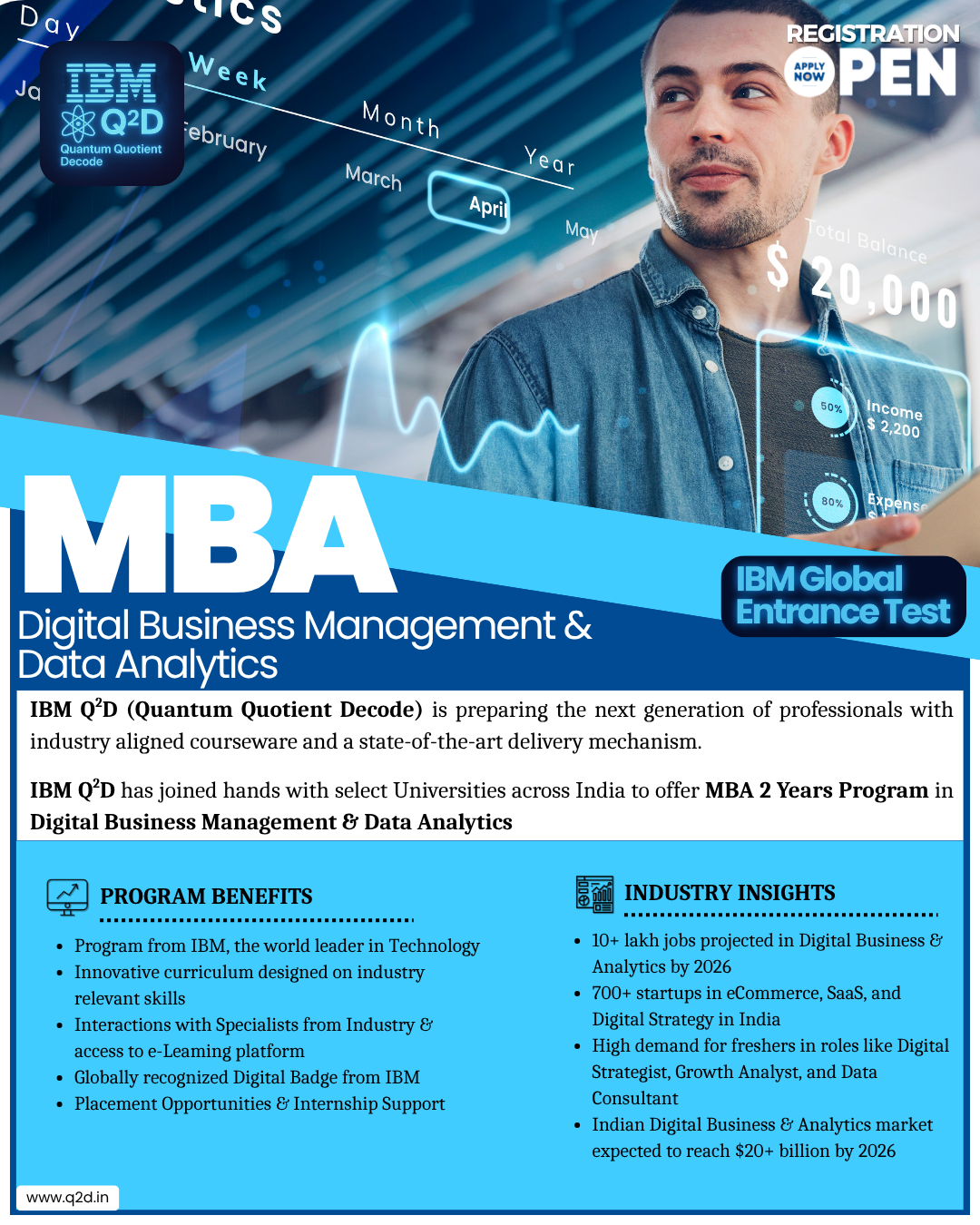Program Description:
IBM Q²D is a global initiative offering specialized master’s programs in collaboration with top academic institutions. We are offering an advanced 2-year MBA program specializing in Management & Data Analytics.
S - Vyasa Deemed to be University located inside Sattva Global City, Kengeri, which is a NAAC A+, Category 1 University, would be the first university in India toexecute this model of student engagement in designed to equip students with cutting-edge skills, real-time exposure, and practical project experience, aligning with future workforce demands.
You've embarked on a cutting-edge master's program, crafted with industry leaders and delivered by IBM subject matter experts in a world-class learning environment.
Program benefits include:
- A Postgraduate Degree awarded by S-VYASA
- An Advanced Certificate Digital Badge from IBM
- Advanced Learning Certificate from Cambridge University Press and Assessment
This strategic academic-industry collaboration is designed to equip students with both foundational knowledge and practical skills in emerging domains, preparing them for high-impact careers in the digital era.
Campus Location:
All programs are conducted at the futuristic S-VYASA Bangalore Campus, located inside Sattva Global City IT Park, Kengeri.
The "Specialist in Analytics for Business" program is an advanced and cuƫng-edge curriculum designed to cultivate highly skilled analytics professionals capable of navigating the complex landscape of modern business data. This program uniquely integrates foundational data analytics with emerging technologies like Generative AI, alongside traditional descriptive and predictive modeling, and specialized applications across various industries and digital plaƞorms. Learners will gain the expertise to not only analyze historical data and forecast future trends but also to harness AI for innovative insights, understand digital consumer behavior, and drive strategic outcomes across diverse business domains.


FEE STRUCTURE 2025-26
| Duration: 2 Years | I YEAR | II YEAR |
| Admission fee | 15000 | - |
| Tuition Fee | 395000 | 385000 |
| Other Academic Fee | 5200 | 5200 |
| Total Fee | 415200 | 390200 |
Program Objectives
Upon successful completion of this program, learners will be able to:
- Harness Generative AI: Understand and apply Generative AI concepts and prompt engineering techniques to enhance data analysis, content creation, and problem-solving.
- Master Foundational Analytics: Competently perform data manipulation, cleaning, and basic analysis using Excel, forming a strong base for advanced analytics.
- Derive Business Insights: Apply descriptive analytics and business intelligence methods to interpret historical data, create compelling visualizations, and generate actionable reports.
- Develop Predictive Models: Utilize advanced analytical and statistical techniques to build predictive models for forecasting, risk assessment, and strategic planning.
- Analyze Digital Behavior: Employ social and web analytics tools and methodologies to understand online user behavior, optimize digital strategies, and measure campaign effectiveness.
- Apply Analytics Across Industries: Strategically implement analytical frameworks and derive insights to address specific business challenges within banking, retail, healthcare, manufacturing, finance, HR, marketing, and supply chain.
- Communicate Data-Driven Solutions: Effectively articulate complex analytical findings and recommendations to diverse stakeholders, facilitating informed decision-making.
Program Summary
The "Advanced Certificate in Analytics for Business" is a practical, application-focused program that guides learners through the journey of transforming data into strategic assets. Starting with foundational Excel kills for data handling, it progresses to mastering descriptive analytics for understanding past performance and then delves into advanced predictive techniques to anticipate future trends. The program culminates in a comprehensive exploration of how these analytical skills are specifically applied across critical business functions and diverse industries, preparing graduates to confidently leverage data for competitive advantage.
Flow of Learning Modules:
- This module introduces learners to the revolutionary concepts of Generative AI and the critical skill of prompt engineering.
- It will explore how AI models can generate content, synthesize information, and assist in complex problem-solving.
- The focus will be on learning to craŌ effective prompts to elicit desired outputs from AI models, seƫng a forward-looking foundation for leveraging AI in analytics workflows.
- Serving as the foundational analytics module, this segment grounds learners in core data concepts and practical data handling.
- It emphasizes hands-on data manipulation, cleaning, and preliminary analysis using MicrosoŌ Excel, ensuring proficiency in widely used business tools.
- This module builds essential skills for organizing and deriving initial insights from raw datasets, a prerequisite for more advanced analytical techniques.
- Building on Excel proficiency, this module delves into the art of understanding "what happened" in business.
- Learners will learn to summarize, visualize, and interpret historical data, transforming it into meaningful reports and interactive dashboards.
- The focus is on mastering techniques to present past performance clearly and identify key trends and paƩerns for business intelligence.
- This module shiŌs the focus to "what will happen," equipping learners with skills in forecasting and predictive modeling.
- It covers a range of advanced analytical techniques, including statistical modeling and potentially an introduction to machine learning algorithms.
- Learners will gain the ability to build models that predict future outcomes, enabling proactive decision-making and strategic foresight.
- This module specializes in analyzing data from digital plaƞorms, focusing on online user behavior and engagement.
- Learners will learn to collect, analyze, and interpret data from social media, websites, and other digital channels.
- The emphasis will be on understanding digital consumer journeys, optimizing online presence, and measuring the effectiveness of digital marketing and communication strategies.
- This capstone module integrates all previously learned analytical and AI skills by applying them to specific real-world industry challenges.
- Learners will explore case studies and practical applications of analytics across a broad spectrum of business functions and sectors.
- The module aims to provide a holistic understanding of how analytical insights drive strategic value and solve complex problems within diverse organizational contexts.
Program Outcomes:
Upon successful completion of this program, learners will be able to:
- Leverage Generative AI and prompt engineering to enhance analytical processes and generate innovative business insights.
- Competently collect, clean, transform, and analyze data using foundational tools like Excel.
- Develop and present comprehensive descriptive analytics reports and business intelligence dashboards.
- Design, implement, and evaluate predictive models to forecast business outcomes and inform strategic decisions.
- Conduct in-depth social and web analytics to understand digital behavior, optimize online presence, and measure campaign performance.
- Apply specialized analytical techniques to solve industry-specific problems in sectors such as banking, retail, healthcare, manufacturing, finance, HR, marketing, and supply chain
- Communicate complex analytical findings and recommendations effectively to both technical and non-technical audiences.
- Contribute as a data-driven specialist, leading initiatives that transform raw data into tangible business value.
Skills Gained:
Upon completion of this program, learners will gain the following skills:
- Generative AI Application
- Prompt Engineering
- Data Cleaning and Preprocessing (Excel)
- Data Manipulation (Excel)
- Descriptive Statistics
- Data Visualization and Reporting
- Business Intelligence Dashboard Design
- Predictive Modeling (e.g., Regression, Classification basics)
- Statistical Analysis
- Forecasting
- Social Media Analytics
- Web Analytics (e.g., Google Analytics concepts)
- Digital Marketing Measurement
- Industry-Specific Analytics (Banking, Retail, Healthcare, Manufacturing, Finance, HR, Marketing, Supply Chain)
- Problem-Solving with Data
- Strategic Decision-Making
- Data Storytelling and Communication
